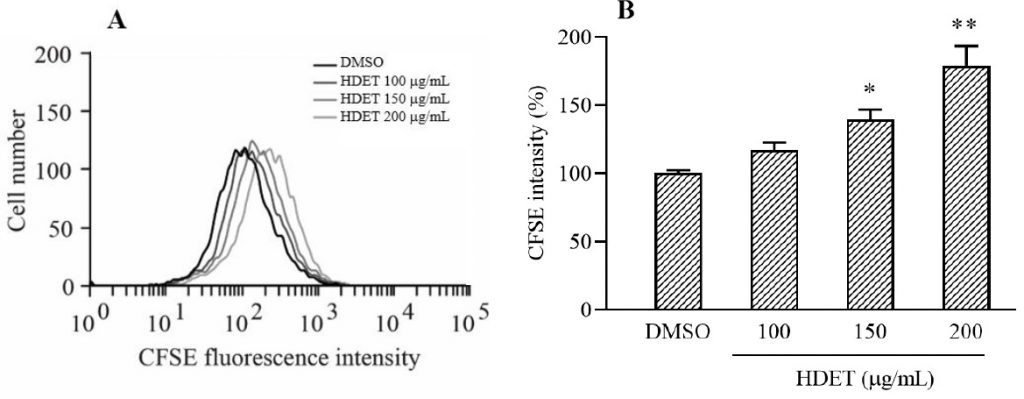
ฤทธิ์ของสารสกัดจากสาหร่ายลิ้นมังกรในการต้านเซลล์มะเร็งเต้านม MDA-MB-231 โดยการยับยั้งการแบ่งเซลล์และเปลี่ยนแปลงระดับของโปรตีนที่ใช้ในการแบ่งเซลล์
Highlight
สาหร่ายลิ้นมังกร Halymenia durvillei (HD) มีฤทธิ์ในการต้านไวรัส ต้านแบคทีเรีย ต้าอนุมูลอิสระ และต้านมะเร็ง โดยมีการศึกษาทั้งในเซลล์มะเร็งลำไส้ใหญ่ มะเร็งปอด มะเร็งกระเพาะอาหาร และมะเร็งต่อมลูกหมาก ในการศึกษาวิจัยนี้จึงได้ทำการศึกษาการออกฤทธิ์ในการต้านเซลล์มะเร็งเต้านมชนิด triple-negative (MDA-MB-231) ผลการศึกษาวิจัยพบว่าสารสกัดจากสาหร่ายลิ้นมังกรสามารถฆ่าเซลล์มะเร็งและยับยั้งการแบ่งเซลล์ได้ โดยการลดระดับของยีนที่ควบคุมการแบ่งเซลล์ นอกจากนี้ยังสามารถเพิ่มระดับอนุมูลอิสระภายในเซลล์ ขณะที่การตายของเซลล์แบบ apoptosis และการเปลี่ยนแปลงระดับของเอ็นไซม์ caspase ยังไม่มีผลมากนัก
ที่มาและความสำคัญ
สาหร่ายลิ้นมังกร Halymenia durvillei (HD) มีฤทธิ์ในการต้านไวรัส ต้านแบคทีเรีย ต้าอนุมูลอิสระ และต้านมะเร็ง โดยมีการศึกษาทั้งในเซลล์มะเร็งลำไส้ใหญ่ มะเร็งปอด มะเร็งกระเพาะอาหาร และมะเร็งต่อมลูกหมาก ในการศึกษาวิจัยนี้จึงได้ทำการศึกษาการออกฤทธิ์ในการต้านเซลล์มะเร็งเต้านมชนิด triple-negative (MDA-MB-231)
Abstract
Background and purpose:
The GC-MS analysis reported n-hexadecanoic acid or palmitic acid as a major component of the ethanolic extract of Halymenia durvillei (HDET). This compound shows cytotoxic effects against various human cancer cells. The present study investigated the effect of HDET on the viability and proliferation of MDA-MB-231, a triple-negative breast cancer (TNBC) cell line.
Experimental approach:
Cell proliferation and cell cycle analysis were determined by flow cytometry and cell cycle regulatory protein expression levels were then determined by Western blotting. The presence of reactive oxygen species (ROS) was evaluated by dichlorofluorescein, followed by analyzing changes in gene expression of antioxidant enzymes using a real-time polymerase chain reaction.
Findings/Results:
HDET dose-dependently reduced cell viability with the 50% inhibitory concentration (IC50) of 269.4 ± 31.2 µg/mL at 24 h. The cell proliferation assays showed increased succinimidyl ester fluorescent intensity after treatment with ≥ 100 µg/mL of HDET, indicating the inhibition of cell proliferation. Cell cycle analysis using propidium iodide staining showed an increased percentage of cells in the G2/M phase. HDET also decreased the levels of cell cycle regulatory proteins including cyclin D1 and increased the level of p21. HDET promoted oxidative stress by increasing ROS levels along with the reduction of catalase expression. However, HDET did not induce apoptosis and caspase activation in TNBC cells.
Conclusion and implications:
These findings suggest that HDET which is rich in palmitic acid may serve as a potential therapeutic agent to target TNBC via arrest cell cycle progression at the G2/M phase.
KEYWORDS: Cell cycle arrest, Red algae, Triple-negative breast cancer
Citation: Settacomkul, R., Sangpairoj, K., Phuagkhaopong, S., Meemon, K., Niamnont, N., Sobhon, P., Vivithanaporn, P. Ethanolic extract of Halymenia durvillei induced G2/M arrest and altered the levels of cell cycle regulatory proteins of MDA-MB-231 triple-negative breast cancer cells. Research in Pharmaceutical Sciences, 2023, 18(3), pp. 279–291. https://doi.org/10.4103/1735-5362.371584
RELATED SDGs:
SDG Goal หลัก ที่เกี่ยวข้อง
3. GOOD HEALTH AND WELL-BEING

ผู้ให้ข้อมูล: รองศาสตราจารย์ ดร.ไกร มีมล
ชื่ออาจารย์ที่ทำวิจัย: รองศาสตราจารย์ ดร.ไกร มีมล
ภาพถ่าย: รองศาสตราจารย์ ดร.ไกร มีมล
Tags: Cell cycle arrest, Red algae, Triple-negative breast cancer
